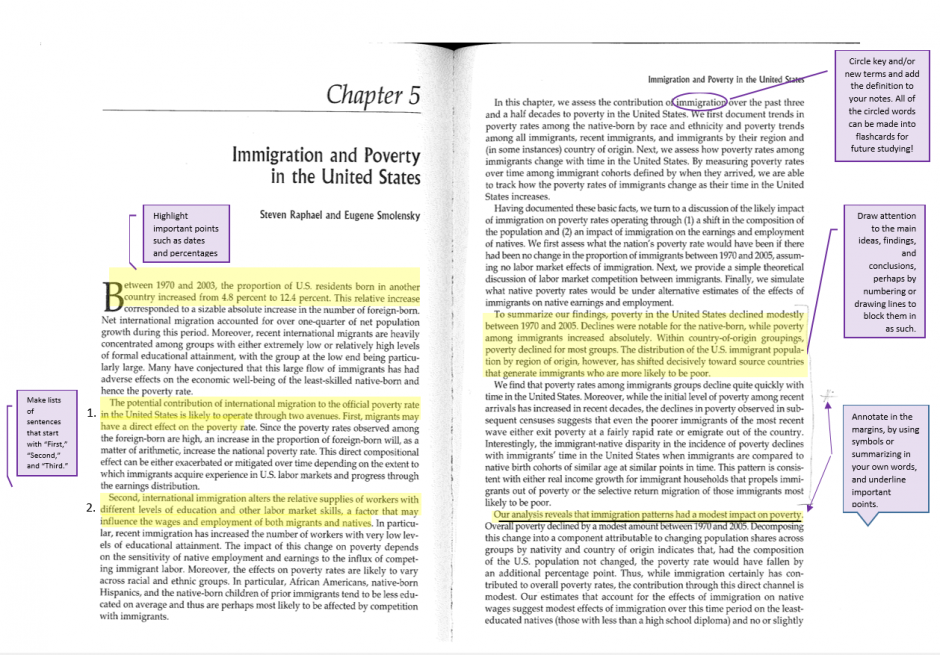At the UW, you will be asked to read a wide variety of material with a high level of comprehension, pick out main points and recognize significant details, and connect the literature/readings from class with your assignments. Although high school often focused on what the author is saying through use of literary devices like "symbolism" and "shadowing," reading in college focuses on understanding large amounts of text, organizing it into managing chunks, and reflecting on it in the context of the piece and in our lives.
To make meaning out of a text, it's important to be an active reader and fit new facts into a pre-existing web of information. It's important to engage in a dialogue with the text, ask meaningful questions, and search for answers.
Different disciplines may require to read different kinds of texts depending on the subject - you may "read" and analyze behaviors of a group of people in Sociology, read a sequence of events and determine cause and effect in History, or read a space and how people interact with it in a Geography or Architecture class.
Alternatively, for STEM courses, your reading may include much tables, graphs, and formulas. You will be required to read closely to understand what these figures mean.
When reading for an assignment,it is important to start by understanding the practices of the disccipline and requirements of the assignment: are you being asked to observe? To argue? To compare? Keep this guiding question in mind as you work through the text.
Make sure to make time for your reading. As you go on to tackle all of your reading try to:
Plan specific times to read during the day/week.
Delegate enough time. How many pages can you read in an hour? Count your assigned reading for the week and make a realistic estimate.
Do your readings in a distraction-free space to ensure that you'll stay on task!
Prioritize and break apart your longer readings. Also take a break from longer readings by interchanging them with shorter readings.
The Expository Writing Program describes “close reading” as analyzing a text — be it a photograph, a short story, a poem, a scholarly essay, an operation manual, a tax form, a television commercial — very carefully, crystallizing main ideas, and then drawing conclusions or making decisions based on your analysis.
Active reading strategies can help concentration and challenge you to think while you read, which improves both comprehension and retention. As you work through a text, here are some strategies to keep in mind:
Read actively by noting in the margin or highlighting significant passages or sections and identifying themes throughout the reading.
Use your margins to annotate the text by summarizing it, noting the significance, and connecting it to other readings and assignments from class.
Review your reading notes periodically by reading the content before class and revisiting it after class. Use your class notes to complement your personal reading notes.
Ask questions about "how" and "why" you noticed specific passages.
Identify specific goals for your reading
Preview your reading. Spend five minutes looking at headings, first and last sentences of paragraphs, and executive summaries. This gives you some sense of what the chapter holds.
Use sections to build an outline for your personal notes.
Look up any words you don't know.
As you mark up your text, focus on highlighting important points and ensuring that you can remember the significance of things you note. The example below shows you how you can carry out some of these steps in marking your reading text.

Once you've read the text itself, take time to explore the context of the text such as historical events, social and cultural values, and/or political movements occurring at the time. You might take a trip to the library or do some online research. Perhaps your professor has reserved some books on the subject. Maybe they have discussed the context of a particular book in class.
Try this: Use the margins to record your reading goals and your reactions to what you read. This improves your concentration and makes it easier to review and recall your reading. Your reactions may include summaries, questions, personal associations, your opinions, your own ideas, notes to cross-reference other passages, or notes drawing your attention to others who agree or disagree.
Once you finish your reading, be sure to review these notes daily or weekly. Read for 50 minutes, review for 5, break for 5.
Review by:
Recite. As you quiz yourself or review important points, recite the information aloud to yourself.
Many students are challenged by the difficulty and quantity of college reading assignments. Students want to read quickly, but you also need to comprehend and retain what you read. Practicing these strategies will make you a more efficient reader in the long run.
Try this: If you encounter a difficult sentence or passage aloud, try reading it aloud and then paraphrase it. This is also a good technique to try in a study group, if everyone is stuck on the same passage!
When you've finished a difficult passage, chapter, or article:
Adapted from Active Learning: A Study Skills Worktext by Rory Donnelly (1990).